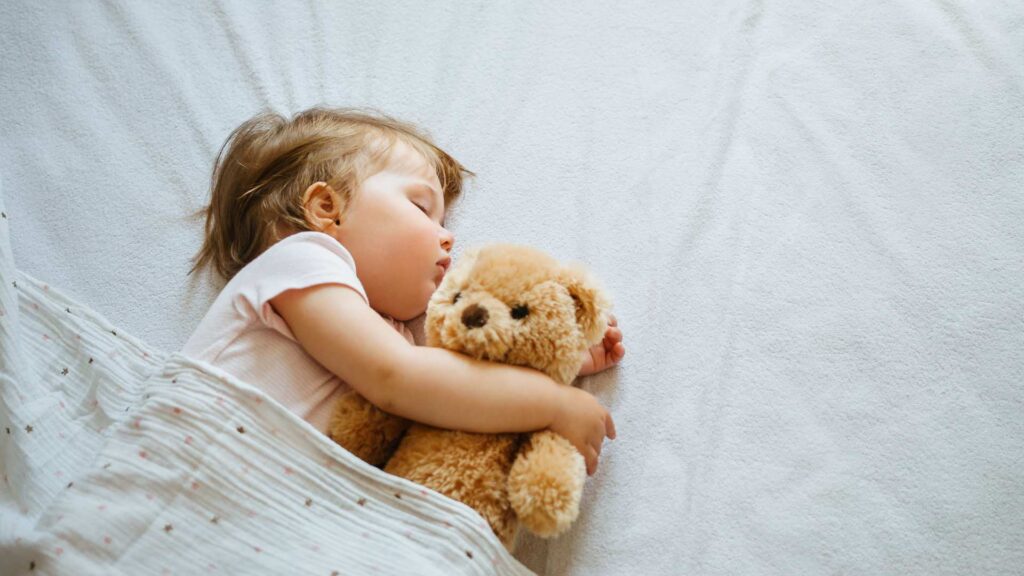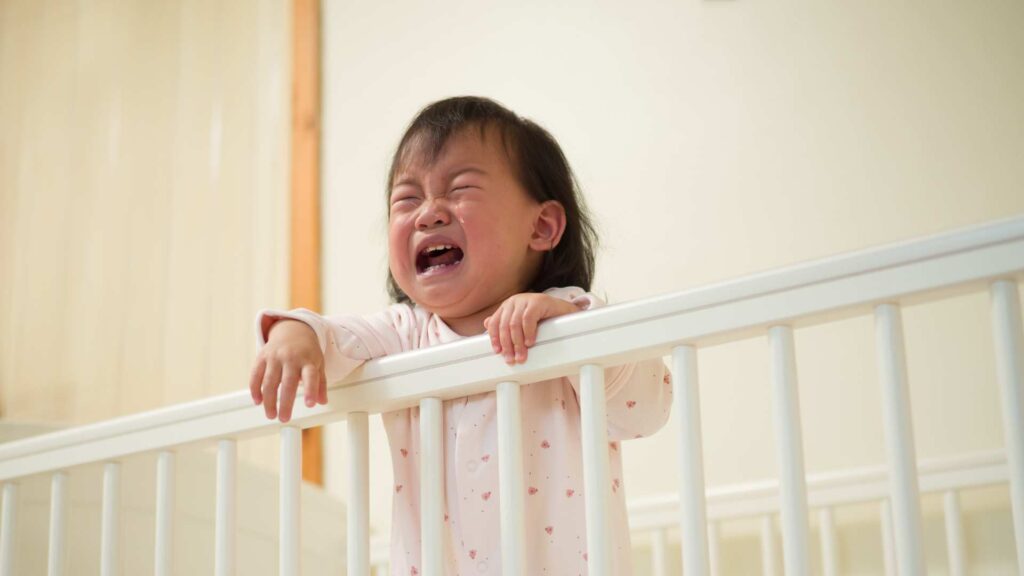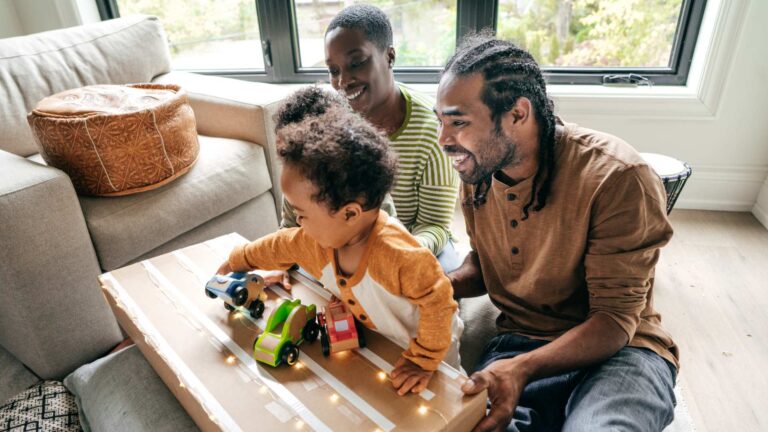Table of Contents
Why do children with autism struggle to sleep?
Sleep is one of the most essential functions of the human body, allowing us to rest, recover, and regulate crucial processes. But if you’re a parent or caregiver of a child with autism spectrum disorder (ASD), you may have noticed that bedtime isn’t always smooth. Autism and sleep can be an everyday struggle, whether it’s trouble falling asleep, staying asleep, or feeling rested in the morning.
If you’ve experienced endless bedtime battles, restless nights, or early morning wake-ups, you’re not alone; many parents also experience this situation with their neurodiverse children. Sleep difficulties are common among children on the spectrum, becoming another characteristic of daily life challenges. But why do these sleep struggles happen? Why do children with autism struggle to sleep? More importantly, what can parents do to help?
In this blog by ABA Centers of Georgia, we’ll explore the connection between autism and sleep, common challenges, the effects of poor sleep, and practical strategies to create more restful nights. So, keep reading and gain helpful knowledge not just for you but for the autism community!
Autism and Sleep: The Common Struggles
Sleep issues are significantly more common in children with autism compared to their neurotypical peers. Research by the Journal of Pediatric Neurosciences suggests that between 40% and 80% of children on the spectrum experience sleep disturbances. The sleep issues range from difficulty falling asleep to frequent night wakings and early morning awakenings. Some factors include differences in melatonin production, genetic factors, and environmental influences.
Many children with autism have differences in melatonin production, the hormone responsible for regulating sleep-wake cycles. Their bodies may not produce enough melatonin or may release it at irregular times, making it harder to fall asleep and stay asleep, according to Biomedicine & Pharmacotherapy.
Sensory sensitivities are a primary factor for challenges in autism and sleep. Children may experience these sensitivities in their daily lives and at different times of the day, for example, when eating breakfast, taking a shower, and, indeed, when trying to sleep. A room that feels too bright, too noisy, or even the sensation of certain fabrics on the skin can create discomfort that prevents relaxation.
Moreover, Archives of Pediatrics & Adolescent Medicine measured sleep patterns in three groups of children: Individuals with autism, others with typical development, and those with developmental delays but no autism. The findings reveal that children with autism had significantly shorter total sleep time and, most importantly, spent much less time in REM sleep (about 14.5% compared to 22-25% in other children). REM sleep is crucial for brain development and emotional processing.
Finally, anxiety and rigid routines also play a role. Many children with autism thrive on predictability, and any deviation from their usual bedtime routine can cause distress. Others may experience heightened anxiety that makes it difficult for them to relax and transition into sleep.
Common Sleep Difficulties in Children with Autism
Some children with autism struggle to fall asleep, waking up frequently during the night or rising very early in the morning. Let’s discover more about some common signs of deprivation of sleep in autism:
- Difficulty falling asleep: Even after a full day of activities and physical exercise, some children struggle to wind down and transition into sleep. They may engage in repetitive behaviors or need excessive reassurance before feeling comfortable enough to rest.
- Frequent night wakings: Children often wake up multiple times throughout the night and have trouble falling back asleep without assistance.
- Early morning awakenings: Some children wake up much earlier than expected, leading to sleep deprivation and exhaustion.
- Irregular sleep patterns: Some children sleep for short periods at unusual hours, making it difficult for parents to establish a consistent sleep routine.
- Co-occurring conditions: Overlapping conditions such as ADHD, anxiety, and gastrointestinal issues, which are more common in children with autism, can also contribute to poor sleep.
Consequences of Bad Sleeping
Lack of sleep doesn’t just lead to tired mornings for everyone. It can have significant effects on a child’s mood, behavior, and overall well-being. Sleep deprivation is linked to increased irritability, heightened anxiety, and difficulty focusing, all of which can make learning and social interactions more challenging. Many parents may notice that when their child sleeps poorly, they experience more meltdowns, struggle with communication, and have a more difficult time regulating emotions.
For families, disrupted sleep patterns in their kids can take a significant burden on themselves, too, as they will experience sleep deprivation as well, which will cause them stress and even physical issues over time.
How Parents Can Improve Sleep in Autism
Helping a child with autism develop better sleep habits requires patience, consistency, and sometimes a bit of creativity. Here are some strategies that can make a difference:
1. Create a predictable bedtime routine: Establish a calming, structured routine that signals to your child that it’s time to sleep. You can include a warm bath, reading a book, or listening to soothing music before going to bed.
2. Control the sleep environment: Minimize sensory triggers by conditioning the room according to their preferences and needs. For instance, if they like a dimmer environment, try to have warm lights; if your kid doesn’t like certain textures, avoid them; if the cold makes them uncomfortable, adjust the room temperature. You can even consider adding blackout curtains, white noise machines, or weighted blankets if your child finds them comforting.
3. Limit screen time before bed: Exposure to screens can interfere with melatonin production, making it harder for children to fall asleep. Try reducing screen use at least an hour before bedtime.
4. Encourage daytime activity: Regular physical activity can help regulate energy levels and promote better sleep at night.
5. Use visual schedules: If your child benefits from visual cues, consider using a bedtime chart that outlines each step of the routine.
6. Be mindful of diet: Avoid caffeine and sugar before bedtime, and consider offering a light snack if hunger is an issue.
ABA Centers of Georgia Promotes Healthy Sleep in Autism
At ABA Centers of Georgia, we consider the various skills and needs of children with autism and their families. We not only focus on addressing challenging behaviors, but we also assist families in achieving better overall wellness at home, for instance, by cultivating healthier sleep habits.
Through ABA therapy, our BCBAs and RBTs modify certain behaviors while cultivating positive skills that will be helpful for their day-to-day and more independent future. ABA techniques such as positive reinforcement, gradual desensitization, and structured routines can help children feel more comfortable with their learning, including autism and sleep.
Find out how we have helped families in Alpharetta, Atlanta, Buckhead, and Marietta and how we can help you and your little one with autism better navigate the spectrum. Call us at (855) 929-5058 or contact us online to verify your insurance.











